Ivan Dziuba
Ivan Dziuba Дзюба Іван Михайлович | |
|---|---|
 Ivan Dziuba in 2004 | |
| Personal details | |
| Born | July 26, 1931 Mykolaivka, Volnovakha Raion, Ukrainian SSR |
| Nationality | |
| Awards | |
Ivan Dziuba (Ukrainian: Іва́н Миха́йлович Дзю́ба) (born 26 July 1931) is a Ukrainian literary critic, social activist, Russian philologist, dissident, Hero of Ukraine, academic of National Academy of Sciences of Ukraine, the second Minister of Culture of Ukraine (1992—1994), Head of the Committee for Shevchenko National Prize (1999–2001).
Co-Chief of Editorial Board of the Encyclopaedia of Modern Ukraine.
Chief editor of the magazine The Contemporary (Сучасність) in the 1990s, a member of the editorial boards of scientific magazines "Київська старовина", "Слово і час", "Євроатлантика" and others.
Biography[]
Born into a peasant family. Until 17 years of age spoke only in Russian language.[1]
In 1932, Ivan's family, fleeing from the famine, moved from their home village to the nearby workers' village Novotroyits'ke for a short time. Later, they moved to Olenevski Quarry (now Dokuchaievsk), where Dziuba finished secondary school № 1.
He graduated from Donetsk Pedagogical Institute, and pursued postgraduate studies in the . His work was first published in 1959.
In the 1970s, he was subjected to political persecutions for the views he expressed in some publications.
In the end of 1965 Dziuba wrote his work Internationalism or Russification? (London, 1968, and "Motherland" magazine (ukr. "Вітчизна"), 1990, No. 5-7), dealing with the problems threatening national relations in socialist society, which he sent to the Communist authorities. A special commission of the Central Committee of the Communist Party of Ukraine inspected the text and decided that it was "lampoons on the Soviet reality, the national policy of the CPSU and the practice of communist construction in the USSR." Authorities accused Dziuba of undermining Soviet friendship of peoples, and fueling hatred between the Ukrainian and Russian peoples. In 1972 he was sentenced to 5 years in prison and 5 years in exile. Later he asked for pardon and after 18 months in prison Dziuba was pardoned and hired to work at the newspaper of Antonov Serial Production Plant.
After the change of political situation in the Soviet Union and transition to the independent Ukraine Dziuba became popular. He became co-founder of the People's Movement of Ukraine. From 1991 Dziuba was the head publisher of the Suchasnist Magazine.
Laureate of the Shevchenko Prize, O. Biletsky Prize, Antonovich Fund International Prize, Volodymyr Vernadsky Prize.
See also[]
References[]
Further reading[]
- Шевченківські лауреати. 1962—2001: Енциклопедичний довідник. — К., 2001. — С. 136—138.
Bibliography[]
- Дисидентський рух в Україні
- Мирослав Попович. Перевідкривач: до 70-річчя Івана Дзюби // Дзеркало тижня
- . Досвітній вогонь. У 1965 році з’явився всесвітньо відомий памфлет Івана Дзюби «Інтернаціоналізм чи русифікація?» // Дзеркало тижня
- Сюндюков Ігор. Тривожний ювілей. В українському домі відзначали 40-у річницю з часу оприлюднення знаменитої праці Івана Дзюби «Інтернаціоналізм чи русифікація?» // День[permanent dead link]
- Довідник «Хто є хто в Україні». - К.: К.І.С.
- Письменницький довідник // Національна спілка письменників України
- Recipients of the title of Hero of Ukraine
- 1931 births
- People from Mykolaivka, Donetsk Oblast
- Ukrainian anti-Soviet resistance movement
- Ukrainian politicians before 1991
- Ukrainian dissidents
- Ukrainian academicians
- Living people
- Ukrainian editors
- Recipients of the Shevchenko National Prize
- Culture ministers of Ukraine
- Soviet dissidents
- People from Volnovakha Raion
- Holodomor
